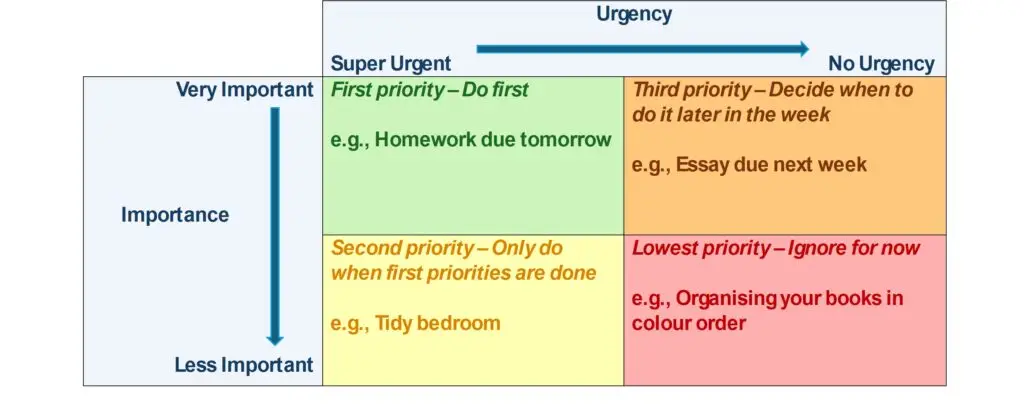Time management involves estimating how long a task may take and how it fits into the rest of your day. These skills can help you be punctual while setting and achieving realistic goals. Good time management can help you balance education, work, leisure and a fun social life.
Here are some key tips:
- Use a calendar with reminders: Make sure any important dates or times are in your calendar and set up reminders and prompts on your phone.
- Prioritise tasks: Decide which tasks are more important or have urgent deadlines. You could use a list to focus on what needs to be done first or you could try a priority matrix by identifying what is urgent and not urgent and what is important and not so important.
- Create a timetable with time blocks: Use a planner or calendar to block out times for classes, homework, and activities. Make sure you include breaks and fun activities.
- Limit distractions: Identify distractions (like social media or noises) and try to minimise those interruptions while studying or working on tasks. You could also look at attention and staying focused optional session.
- Set time limits: Give yourself a certain amount of time to spend on a task to prevent procrastination. Set a timer and start. You can also break the task into smaller parts using this method. We expand on estimating task length below.
- Stay flexible: Life can be unpredictable. Don’t worry if you can’t follow your plan exactly; it is just a guide and needs to be flexible to account for the ups and downs of everyday life!
- Review and reflect: At the end of each week, review what you accomplished and what could be improved. Adjust your strategies accordingly.
Priority matrix:

Estimating How Long Things Will Take
Many people with executive function challenges find it very difficult to know how long it will take to do something.
Here are some ways to practice this:
- Break down tasks: Divide larger tasks into smaller, more manageable parts. This makes it easier to estimate the time needed for each part.
- Track your time: Try to keep a record of how long you think a task will take and how long it actually does take you. This historical data can help you make more accurate estimates in the future.
- Add buffers: Always add a little extra time to your estimates to account for unexpected delays or interruptions. Schedule time at the end of the day/week to complete tasks that you didn’t finish.
- Ask others: If you’re unsure how long a task might take, ask your siblings, parents, teachers, or friends what their estimate would be. Having another perspective can provide valuable guidance.
- Use tools: Consider using apps that can help you track and estimate time more effectively. Time trackers can be useful to review and estimate task length.
Before you go to the feedback page, check your problem-solving plans.
- Has this session made you want to change any of the plans?
- Do you have any new plans you would like to add?
Your Plans:
|
No entries match your request. |
